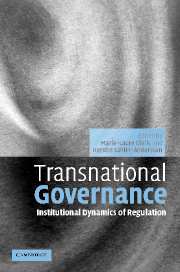Book contents
- Frontmatter
- Contents
- List of figures
- List of tables
- List of contributors
- Acknowledgments
- List of acronyms
- 1 Introduction: A world of governance: The rise of transnational regulation
- I Institutional forces
- 2 Scientization: Making a world safe for organizing
- 3 Marketization: From intellectual agenda to global policy-making
- 4 Organizing the world
- 5 The rationalization of virtue and virtuosity in world society
- 6 Soft regulation and global democracy
- II A dynamic transnational topography
- III Transnational governance in the making
- References
- Index
5 - The rationalization of virtue and virtuosity in world society
Published online by Cambridge University Press: 22 September 2009
- Frontmatter
- Contents
- List of figures
- List of tables
- List of contributors
- Acknowledgments
- List of acronyms
- 1 Introduction: A world of governance: The rise of transnational regulation
- I Institutional forces
- 2 Scientization: Making a world safe for organizing
- 3 Marketization: From intellectual agenda to global policy-making
- 4 Organizing the world
- 5 The rationalization of virtue and virtuosity in world society
- 6 Soft regulation and global democracy
- II A dynamic transnational topography
- III Transnational governance in the making
- References
- Index
Summary
All human beings are born free and equal in dignity and rights. They are endowed with reason and conscience and should act towards one another in a spirit of brotherhood. (Article 1, Universal Declaration of Human Rights)
We will conduct our business openly, with honesty, integrity and trust.
We will respect human rights in all our activities.
We will obey the law and operate in accordance with the highest ethical standards; we will expect the same from our partners, contractors and suppliers. (Unocal Corporation Statement of Principles, 2004)
This year's laureate in Chemistry is being rewarded for his pioneering investigation of fundamental chemical reactions, using ultra-short laser flashes, on the time scale on which the reactions actually occur. (Royal Swedish Academy of Sciences, awarding the 1999 Nobel Prize in Chemistry to Ahmed H. Zewail)
Created in 1957, the World Federation of International Music Competitions is dedicated to establishing a global network of internationally recognized organisations that through public competition discover the most promising young talents in the great tradition of classical music. (World Federation of International Music Competitions 2004.)
Introduction
It should hardly be necessary to insist on the breadth and complexity of the latest phase of globalization. Economic, political, cultural, and technical dimensions of globalization have received a great deal of attention (e.g. Robertson 1992; Appadurai 1996; Held et al. 1999; Micklethwait and Wooldridge 2000; Scholte 2000; Stiglitz 2002), but the moral dimension remains relatively unexplored.
- Type
- Chapter
- Information
- Transnational GovernanceInstitutional Dynamics of Regulation, pp. 95 - 118Publisher: Cambridge University PressPrint publication year: 2006
- 31
- Cited by



